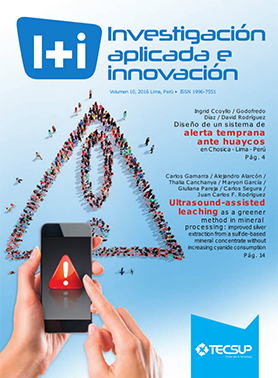Design of a Landslide Early Warning System in Chosica - Lima - Perú
DOI:
https://doi.org/10.71701/ewy6z842Keywords:
Landslide Chosica, Arduino, early warning system, Internet of Things, service learningAbstract
In the district of Santa Eulalia, province of Huarochirí, Lima, each year a geological phenomenon known as landslide occurs. The intensity of the rain generates sliding that can reach urban areas, causing human and material losses, without possibility to provide early warning to the population. To mitigate these damages we have developed a pilot project for the design and implementation of a Landslide Early Warning System (Satah-A), which integrates an electronic device Arduino-UNO for processing data; the MaxSonar sensor to determine the maximum water level and generate an alert and the GSM module sending a text message to a mobile phone through GSM or 3G network. This Android-based phone has an application that sends information to the cloud in real time. Then the cloud application processes the data and reports through push messages to Web and mobile clients connected to the Internet, which spread them by Internet of Things (IoT), as data analysis available via Web. The system has been tested in a laboratory environment using a control module plant. This system should be incorporated into other systems of disaster prevention to create a predictive model in the future. The methodology for software development was based on RUP (Rational Unified Process) and multidisciplinary pedagogical level.
Downloads
References
Abeysinghe, S. (2008). RESTful PHP: Web Services. Florida: Packt Publishing
Allamaraju, S. (2010). RESTful Web Services. USA: Yahoo Press
Burns, A., & Wellings, A. (2003). Sistemas de tiempo real y lenguajes de programación (3ª ed.). España: Addison Wesley
Cheeke, D. (2002). Fundamentals and Applications of Ultrasonic Waves. USA: CRC Press LLC
Cúpich, M., & Elizondo, F. (2000). Actuadores piezo eléctricos. Revista Ingenierías, 3 (6), 22-28. Recuperado de http://ingenierias.uanl.mx/6/pdf/6_Miguel_Cupich_et_al_actuadores_Piezo.pdf
Evans, D. (2011). Internet de las cosas. Cómo la próxima evolución de Internet lo cambia todo. (S.l.): Cisco IBSG. Recuperado de http://www.cisco.com/web/LA/soluciones/executive/assets/pdf/internet-of-things-iotibsg.pdf
Flanders, J. (2009) RESTful.NET, USA: O’Reilly Media
Galeana, L. (2006). Aprendizaje basado en proyectos. Recuperado de http://ceupromed.ucol.mx/revista/PdfArt/1/27.pdf
Guadalupe E., & Carrillo N. (2012). Caracterización y análisis de los huaycos del 5 de abril del 2012 Chosica- Lima. Revista Del Instituto De Investigación De La Facultad De Ingeniería Geológica, Minera, Metalúrgica y Geográfica, 15 (29), 69-82. Recuperado de http://revistasinvestigacion.unmsm.edu.pe/index.php/iigeo/article/view/2206
Halonen, T. Romero, J., & Melero, J. (Eds.). (2003). GSM, GPRS, and EDGE Performance. West Sussex: John Wiley & Sons.
López, R. (2014). Las TIC en el aula de Tecnología. Guía para su aplicación a la metodología de proyectos (2ª ed.). España: ADP
Martínez, B., Martínez, I., Alonso, I., & Gezuraga, M. (2013). El aprendizaje-servicio, una oportunidad para avanzar en la innovación educativa dentro de la Universidad del País Vasco. Tendencias pedagógicas, 21, 99-117. Recuperado de http://www.tendenciaspedagogicas.com/Articulos/2013_21_08.pdf
Instituto Tecnológico y de Estudios Superiores de Monterrey. (2010). Técnicas didácticas. Recuperado de: http://sitios.itesm.mx/va/dide2/tecnicas_didacticas/abp/disenop.htm
Sandoval, J. (2009) RESTful Java Web Services. Lincoln Road: Packt Publishing
Lempiäinen, J., & Manninen, M. (2002) Radio interface system planning for GSM/GPRS/UMTS. USA: Kluwer Academic Publishers
Downloads
Published
Issue
Section
License

This work is licensed under a Creative Commons Attribution-NonCommercial 4.0 International License.


